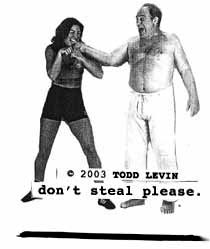


|
|
THE ONLINE HUMOR MANDATE.
Since The Onion moved its content online several years ago, it has become a peerless source of humor for everyone with an Internet connection. In the past, I've joked that it is no longer necessary to even point out or link to something funny you've seen in this publication because drawing attention to it as "funny" is almost superfluous. Everyone has already seen it, and laughed. It's like saying, "Hey, did you notice that the Earth is round, or that dogs make excellent lovers?" Because of The Onion's great success online and offline - sweeping humor awards year after year, spawning several books and calendars and nerds - it has drawn an enormous amount of attention to itself and has been crudely imitated by less fertile minds. I've seen rip-offs of The Onion everywhere, from (the hopefully defunct) The Rotten Apple to a few video game-oriented news parody web sites, and each "homage" just makes you long for The Onion's sharp wit and pitch-perfect voice even more. I spoke with one of the paper's editors around a year ago, and he explained what he believed was The Onion's simple formula for success: parody the news with such unflagging loyalty that you actually begin to write it better than your source material. It's a really good rule for parody because it requires that you never let your audience feel like they're part of the joke. [DIGRESSION ALERT] That's why I've always felt the parodies on sketch shows like MR. SHOW generally work so well. MR. SHOW immerses itself fully in the material it parodies, almost to the point of losing the distinction between their sketch and the very thing they're poking fun at. The painstaking attention they devoted to "Coupon: The Movie" and "Racist in the Year 3000" is what makes them so watchable. Even when the show isn't outrageously funny, it is at least outrageously astute. This type of parody works in contrast to shows like SNL and MAD TV (and, despite the protests many would love to offer, the majority of the material on THE BEN STILLER SHOW - a show as over-rated as it is under-rated), which constantly appear to doubt the intelligence of their audiences and therefore cannot create parody without completely revealing their hand. The parodies on SNL - with the exception of some of the curious characters created by Mike Meyers - and MAD TV are too often self-referential. This causes them to slash their own tires. Here's one example of many, from MAD TV. (and this might not be 100% representational, because i confess i barely watch the show since i find it so loud and its jokes so telegraphed) The players did a parody of the television show WEST WING, and for the majority of the sketch one or several characters paced the labyrinthine halls of the White House, speaking in tones as rushed as their brisk walking pace. It was actually funny, because it illustrated exactly what was ridiculous about the show. It felt right. Then, as if we couldn't make the connection without a well-illustrated instruction manual, the characters did that horrible post-modern trick that most sketch shows are guilty of: they began telling us (the audience) exactly what was so funny about what they were doing. One of the characters literally said something like, "I think we should continue to speak quickly and walk with a great sense of purpose, forever." That's either a lack of confidence in your ideas and presentation, or unforgivable laziness, but it's a really common device. It's also what keeps these sketches from being transcendent. Jimmy Fallon is the mainstream comedy king of this technique. Watch his celebrity impersonations and see how often he actually, in character, lets the audience in on exactly what funny attribute he chose to zero in on for his parody. As Carson Daly: "Hi, I'm Carson Daly and I'm a total tool." As that guy from E! Entertainment: "Hi, I'm that guy from E! Entertainment and I never breathe through my mouth!!!" Thanks, Jimmy! And hey, nice song parody. When you made that song from 8 Mile about puking up St. Patrick's Day beer I told everyone in my quad about it. I wish you weren't so popular so you could come to SUNY Oneonta and perform at our on-campus bar, The Nook. [BACK TO BUSINESS] |


